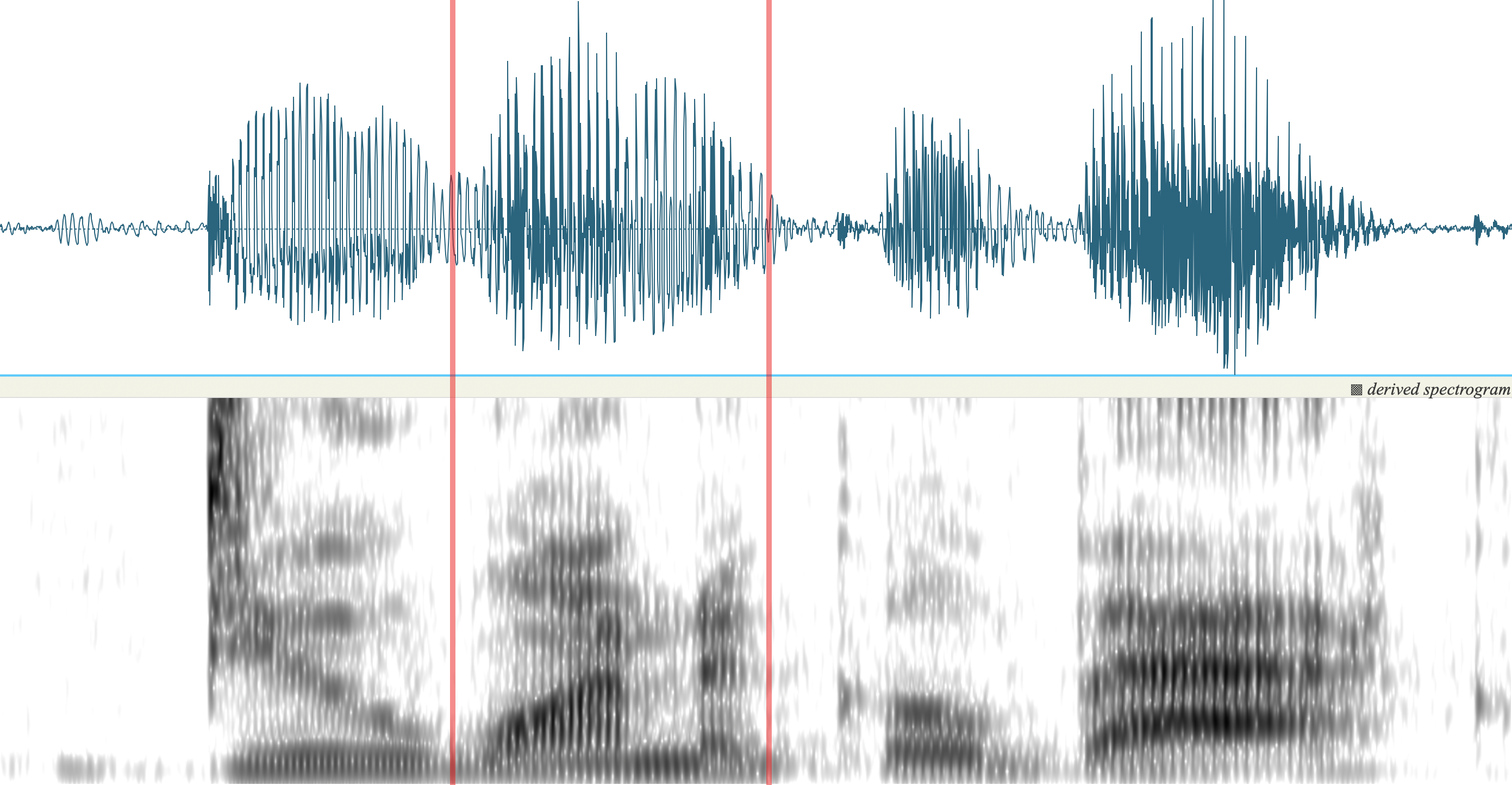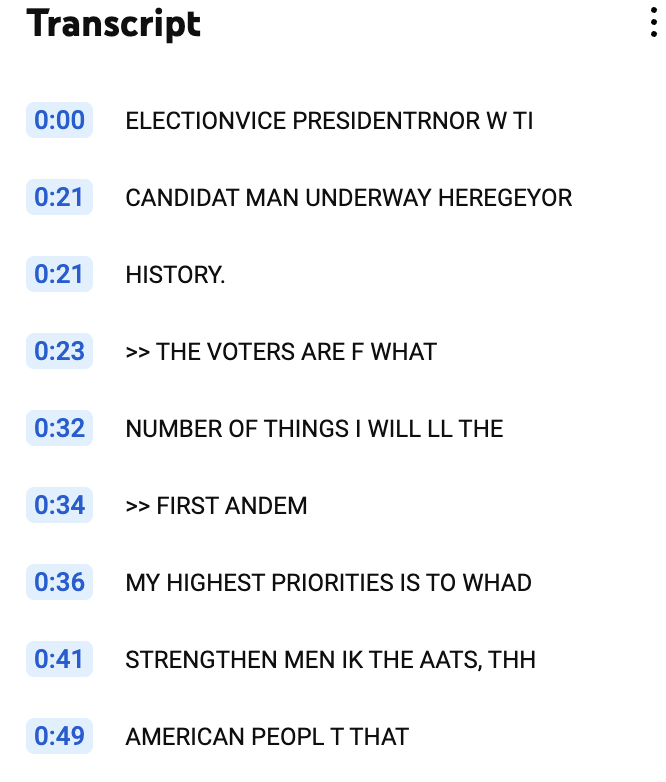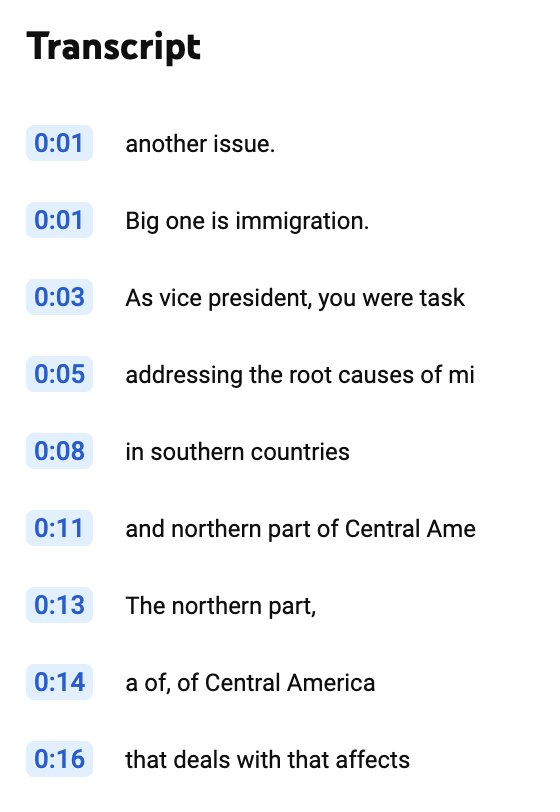Transcription conventions
« previous post | next post »
From Lane Greene on bluesky:
This is an unusual transcript (of Harris/Walz by CNN), filled with "gonna", "wearin'", "I'll tell ya", "pulling outta the race".
These things are ubiquitous in speech, but most transcribers would change these to "going to", "wearing", "I'll tell you", "out of".
edition.cnn.com/2024/08/29/p…— Lane Greene (@lanegreene.bsky.social) Aug 30, 2024 at 7:06 AM
[Here's an image if the embedding doesn't work for you…]
The cited CNN page is a transcript of the whole interview, not subtitles for the video version.
And I agree with Lane that the page's transcription conventions are unusual — when I compare other CNN transcripts, I find the conventional conventions, where e.g. "going to" is spelled "going to" even if the pronunciation is closer to "gonna".
In 4,718 words of the Bash/Harris/Walz transcript on CNN's website, there are 16 instances of "gonna" and 0 of "going to". That would be a plausible choice for representing how people talk these days, just as "can't" is plausible in place of "can not" — but current formal transcription conventions prescribe "going to".
And in contrast, there are 7 instances of "want to", and none of "wanna", even though "want to" is usually (and invariably, here) pronounced as "wanna", in the same way that "going to" is pronounced "gonna". Here's the first of the 7 examples — "But I wonder what you say to voters who do want to go back":
And zeroing in a bit further, on the words "do want to (=wanna) go back", with "wanna" outlined in red:
Whatever the reason for the choices, they're applied in the same way to everyone in the interview. 13 of the 16 instances of "gonna" are in the speech of Harris or Walz, while 3 are due to Dana Bash. All 7 instances of "want to" are attributed to Dana Bash, as are both instances of "outta".
There's one instance of "wearin'" (attributed to Walz), and none of "wearing".
Only one word (sequence) is variably transcribed: there's 1 instance of "tell ya" (due to Harris), and 5 instances of "tell you" (3 attributed to Harris, 1 to Walz, and 1 to Bash).
If you want to look into things further, there doesn't seem to be full audio on the CNN site, but YouTube presents the interview in three parts: Part 1, Part 2, Part 3.
The YouTube transcript for Part 1 is very weird and not at all the same as the CNN page — it starts this way:
The YouTube transcript for Part 2 is less weird, but the lines are mostly truncated:
And the YouTube page for Part 3 has no transcript at all.
For another recent transcription weirdness, see "Putin: 'pollutant'? 'pooch and'?"
Some older relevant posts:
"The history of gonna", 5/9/2010
"True Grit isn't true", 12/29/2010
"Ask Language Log: Writing 'gonna' or 'going to'", 6/25/2011



Philip Taylor said,
September 1, 2024 @ 1:25 pm
As far as I can tell (purely on the basis of empirical observation, no formal study involved) all instances of spoken "going to" are transcribed by YouTube as "gonna". I had an example only yesterday, but because I do not maintain anyrecord of YouTube video recordings watched, I no longer have the URL or timestamp.
Mark Liberman said,
September 1, 2024 @ 2:12 pm
@Philip Taylor: "As far as I can tell (purely on the basis of empirical observation, no formal study involved) all instances of spoken "going to" are transcribed by YouTube as "gonna""
Irrelevant, because the cited transcription is NOT from YouTube.
And also wrong: for example, the transcript from this recent Fox YouTube event (the first one I tried) has 44 instances of "going to" and 0 instances of "gonna".
Trying another at random, this "roundtable conversation" has 59 instances of "going to" and 2 instances of "gonna".
So "going to" is "gonna" in some YouTube transcriptions, but it's not even close to all.
Philip Taylor said,
September 1, 2024 @ 2:45 pm
Clearly we watch different video recordings on YouTube, Mark.
jkroll said,
September 1, 2024 @ 6:37 pm
Not directly relevant to the CNN transcript, but Associated Press style still calls for using the formal forms: "Do not use substandard spellings such as gonna or wanna in attempts to convey regional dialects or informal pronunciations, except to convey an emphasis by the speaker."
Joe said,
September 1, 2024 @ 7:57 pm
I think I'm actually hearing a faint flap in her "want to".
To me "wanna" is just a phonetic transcription of a certain way people often pronounce "want to"; in other words, someone who's been transcribed as "wanna" may believe she said "want to", and might even find it condescending to get the dialect treatment for something so common in US English. That's not the same situation as "can't" vs. "cannot", which the speaker recognizes as two distinct words and she'll agree with the listener on which one she chose.